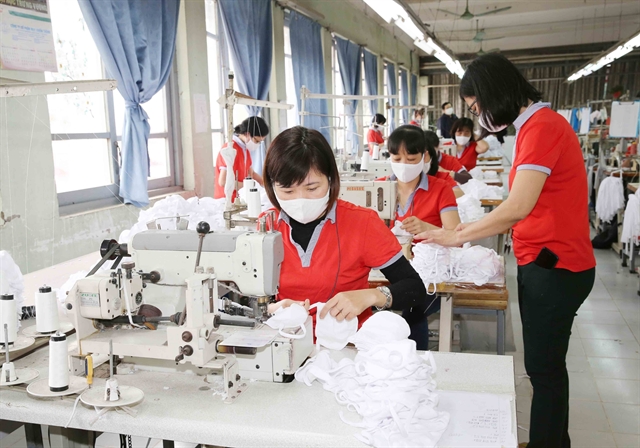The garment industry was suffering an unprecedented crisis due to COVID-19, but the pandemic also brought significant opportunities for Viet Nam to become the world’s face mask factory.

The garment industry was suffering an unprecedented crisis due to COVID-19, but the pandemic also brought significant opportunities for Viet Nam to become the world’s face mask factory.
Many garment producers hit hard by the COVID-19 pandemic recently invested in producing face masks as a solution to cope with the difficult time and take the opportunities arising from the supply shortage.
Some received export orders worth millions of dollars, a positive sign for the garment industry which was under huge pressure from the pandemic.
Recently, Garment 10 Corporation Joint Stock Company said that it received an export order for 400 million medical face masks worth US$52 million, together with orders for 20 million cloth masks from a US partner and two million cloth masks and six million medical face masks from a German partner.
TNG Investment and Trading Joint Stock Company also shipped millions of anti-bacterial cloth masks to the European Union during the past month. TNG was also investing in producing medical face masks which was expected to start production from May.
Anti-bacterial cloth masks helped TNG’s sales in the domestic market in the first quarter of this year increase by 10 per cent against the same period last year.
TNG’s director Nguyen Van Thoi said that there were large opportunities to export face marks.
According to the Ministry of Industry and Trade, 50 domestic producers which reported to the ministry alone had a total production capacity of eight million face masks per day.
Besides, some companies, such as Nam Dinh Silk Textile Joint Stock Company, were now capable of producing anti-bacterial cloth.
The ministry said that Viet Nam’s face mask production capacity could be increased much further.
Caution in investment
Tran Thanh Hai, Deputy Director of the ministry’s Import-Export Department, in an interview with Viet Nam News Agency said that Viet Nam was capable of becoming a big cloth face mask producer in the world.
Trade promotion must be enhanced to raise consumers’ awareness about cloth masks and encourage them to switch to cloth masks instead of medical masks, Hai said.
He, however, noted that firms needed to give careful consideration when investing in face mask production as a long-term or large-scale investment because demand for masks could drop when the pandemic was over.
Face mask producers must pay attention to meeting quality and safety requirements of the import markets and obtain certificates to expand exports, he added.
According to the Viet Nam Trade Office in the EU, many face mask and medical protective clothing producers in Viet Nam contacted the trade office for supports in finding partners for exports of these products.
The trade office said that producers must note that in order to export face masks and medical protective clothing to the EU, they must get CE marking which indicated that a product had been assessed by the manufacturers and deemed to meet EU safety, health and environmental protection requirements.
The mass production of face masks and medical protective clothing without following any technical standards would cause oversupply and damages if the products could not be exported to the EU or any other markets, the trade office said.
Firms should learn about standards for face masks and medical protective clothing at the following address https://ec.europa.eu/commission/presscorner/detail/en/IP_20_502.
Export for medical mask?
Under the Government’s Resolution 20/NQ-CP dated February 28, in the context of the COVID-19 pandemic, medical face masks could be exported only for the purpose of international aid and assistance provided by the Vietnamese Government. In addition, the export volume could be a maximum of 25 per cent of the output.
The regulation aimed to give priority to the fight against the pandemic in the country and ensure adequate medical equipment for doctors
According to Vu Tien Loc, Chairman of the Viet Nam Chamber of Commerce and Industry, the Government should allow the export of medical mask to support domestic producers in overcoming the difficult time.
Loc said that the face mask production capacity of Viet Nam was huge, much higher than domestic demand. While the face mask demand in the foreign markets was increasing rapidly, it was time for domestic producers to grasp that opportunity.
Still, priority must be given to meeting the domestic demand, but it was also necessary to take the opportunity to boost exports, Loc stressed.
Loc also urged the Government to develop a strategy for medical equipment production and export. “Any decision must be timely, especially in the pandemic,” Loc said.
According to Hai, when the COVID-19 pandemic was brought under control, the domestic production capacity and reserve could meet demand, the Government could consider allowing exports of medical masks. — VNS





